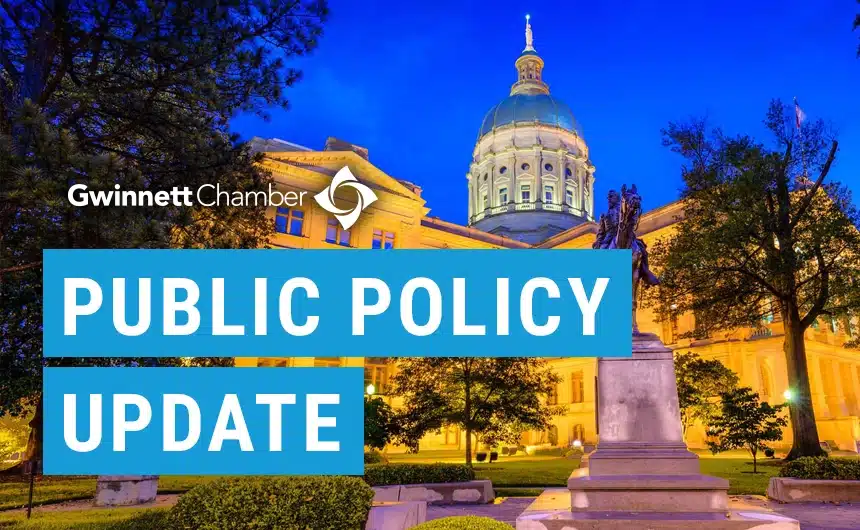The General Assembly convened this week for Legislative Days 28-31. Legislators will resume business next week for Legislative Days 32-35. Monday was Crossover Day with legislators debating, amending, and passing bills into the late evening. This year, over 900 bills were introduced and over 350 passed out of the House and Senate combined. High profile bills like online sports betting and Buckhead cityhood did not pass. However, expect these issues to come back in 2024 (or sooner). Sine Die, the last day of session, is quickly approaching (March 29).
Tax Credit Review
Governor Kemp, Speaker Jon Burns, and Lt. Governor Burt Jones announced an extensive review of the state’s tax credits that will take place between the 2023 and 2024 legislative sessions. One of the notable tax credits up for review is the state’s $900 million film tax credit. HB 581, sponsored by Ways & Means Chairman Shaw Blackmon, revises the deadlines, selection criteria, and required contents for tax credit analysis. The bill has been referred to the Senate Finance Committee.
Budget
On Monday, the 6-member conference committee passed the Amended Fiscal Year 23 budget (HB 18). The mid-year budget includes $1.1 billion to the Georgia Department of Transportation to make up from the gas tax suspension. Also included are the income tax rebate for taxpayers and property tax cuts for Georgia property owners. The House and Senate both supported the conference committee report and now awaits the Governor’s signature. On Thursday, the House passed the FY24 budget (HB 19). The budget fully funds the K-12 QBE formula ($13.1 billion), a $2,000 pay increase for teachers and state employees, a $4,000 pay increase for law enforcement officers, and a 3% cost of living increase for state government pensioners. The only constitutional requirement for lawmakers is to pass a balanced budget.
Governor’s bills
HB 162, sponsored by Rep. Lauren McDonald (Governor’s Floor Leader), would provide a one-time tax credit of $250 for individuals and $500 for married couples who filed taxes in Georgia in 2021 and 2022. The House passed the measure 170-2. The bill passed out of the Senate Finance Committee.
HB 128, sponsored by Rep. Soo Hong (Governor’s Floor Leader), would increase the representation of businesses owned by minorities, women, and veterans in the procurement of state contracts for construction, services, equipment, and goods. The bill passed out of the House 160-3 and has been referred to the Senate Economic Development and Tourism Committee.
SB 42, sponsored by Sen. Mike Hodges (Governor’s Floor Leader), would increase the fines for businesses that fail to comply with model notice requirements for the human trafficking hotline. The bill is assigned to the House Judiciary Non-Civil Committee.
Other notable bills
HB 30, sponsored by Rep. John Carson and co-sponsored by Majority Leader Chuck Efstration, would create a state definition of antisemitism in Georgia and would require state agencies and departments to consider discriminatory intent in investigations. The bill refers to the International Holocaust Remembrance Alliance’s definition of antisemitism. This bill is complimentary to the Hate Crimes legislation that was passed and signed into law in 2020. The House passed the measure 136-22 and the bill is assigned to the Senate Judiciary Committee.
SB 93, sponsored by Senate Majority Caucus Chairman Jason Anavitarte would prohibit a state employee from installing or using a social media platform that is controlled or influenced by a foreign adversary recognized by the GEMA on state equipment. The bill would also require GEMA to maintain and update a list of foreign adversaries. The bill is assigned to the House Public Safety and Homeland Security Committee.
HB 189, sponsored by Rep. Steven Meeks, would increase the weight variance of trucks carrying specific commodities from 5% to 10% (88,000 lbs). The House voted 93-81 and it has been assigned to the Senate Transportation Committee.
HB 406, sponsored by Rep. Rick Jasperse, would create regulations for electric vehicle chargers. It is assigned to the Senate Committee on Regulated Industries and Utilities. The companion bill in the Senate, SB 146, passed out of the Senate 55-1 on Crossover Day and has been assigned to the House Committee on Technology and Infrastructure Innovation.
HB 408, sponsored by Rep. Bruce Williamson, would extend the sales tax exemption for major economic development projects of regional significance to 2026. It is assigned to the Senate Finance Committee.
HB 514, sponsored by Rep. Dale Washburn, would limit local moratoriums on single-family residential development to 180 days and gives exceptions during emergency situations. The bill passed out of the House 127-43 and has been assigned to the Senate Economic Development and Tourism Committee.
HB 517, also sponsored by Rep. Dale Washburn, would prohibit counties or cities from establishing building design standards and large lot size requirements. The bill did not get a vote in the House Government Affairs Committee and was not considered further.
HB 392, sponsored by Rep. Rick Jasperse, would create the Georgia Endowment for Teaching Professionals in the Technical College System that endows postsecondary teaching positions in high-demand courses. The bill passed out of the House 175-0 and has been assigned to the Senate Higher Education Committee.
SR 85, sponsored by Sen. Larry Walker, would create the Senate Occupational Licensing Study Committee to address Georgia’s current occupational licensing laws and requirements.
SR 275, sponsored by Sen. John Albers, would create the Senate Study Committee on Expanding Georgia’s Workforce to review current programs and initiatives to strengthen workforce opportunities.
To learn more about the Chamber’s public policy initiatives, visit https://gwinnettchamber.org/publicpolicy/





